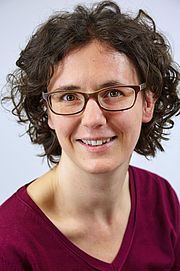Burning is certainly not one of the first measures that comes to mind when it comes to re-naturing habitats. However, when used in suitable areas and at the right time, it can be a method of restoring species-rich open soil habitats.
Because they are no longer used for agriculture, many neglected grasslands and heaths are currently growing too fast, with endangered animals and plants losing their habitat as a result. One of these plants is the medicinal plant arnica. Results from a study conducted by the Arnica Hessen project that includes Hochschule Geisenheim University, the University of Marburg and the Marburg Botanical Garden have shown that arnica seeds can only germinate in open soil. The reason is that arnica, as well as certain other endangered species, depends on light to germinate. However, many areas are covered in dense grass and moss, which has led to a significant decline in numerous arnica species in Hessen. "Until now, grass and moss have often been removed in order to promote species regeneration, which is expensive and time-consuming," explains Prof. Dr. Ilona Leyer from the Department of Applied Ecology at Hochschule Geisenheim University. "The question is whether controlled burning, as has often been used for waste reduction, is a viable and cost-effective alternative to soil removal”. Experts have observed successful results in Germany and neighboring countries.
As part of a project funded by the Hessian Agency for Nature Conservation, Environment and Geology (HLNUG), Hochschule Geisenheim University has removed dense organic litter layers by burning fallow land in nature conservation areas in the Lahn-Dill district. "It is important to involve and inform all relevant parties: the mayor of the respective communities, the nature conservation authorities, and residents, as well as the fire brigade control centers. It goes without saying that the owners and managers of the areas in question must also agree to the burning. We are very grateful for the huge support we have received from the team of the local landscape conservation association”, says head of project Illona Leyer. Trained employees of a company that specializes in burning for nature conservation supervised the fire, ensuring that safety standards were met.
In the next step, arnica seeds and young plants will be sown onto the burned soil and their development will be observed. Through comparison with areas that have not been burnt, the project aims to observe the effects burning has on vegetation. Using the results, a guideline will be created to summarize suitable landscape management measures for the conservation of arnica and its habitats.
Contact:
Hochschule Geisenheim University
Department of Applied Ecology
Von-Lade-Straße 1
65366 Geisenheim
Ilona.leyer@hs-gm.de


























